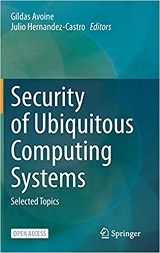
|
FreeComputerBooks.com
Links to Free Computer, Mathematics, Technical Books all over the World
|
|
- Title: Security of Ubiquitous Computing Systems
- Author(s) Gildas Avoine, Julio Hernandez-Castro
- Publisher: Springer; 1st ed. 2021 edition; eBook (Creative Commons Licensed)
- License(s): Creative Commons License (CC)
- Hardcover: 283 pages
- eBook: PDF (268 pages) and ePub
- Language: English
- ISBN-10/ASIN: 3030105903
- ISBN-13: 978-3030105907
- Share This:

|
The objective of this open access book was to improve and adapt existent cryptanalysis methodologies and tools to the ubiquitous computing framework. The cryptanalysis implemented lies along four axes: cryptographic models, cryptanalysis of building blocks, hardware and software security engineering, and security assessment of real-world systems.
The uniqueness of this book is the combination of important fields like the Internet of things and ubiquitous computing. It contains numerous examples, case studies, technical descriptions, scenarios, procedures, algorithms and protocols.
The authors are top-class researchers in security and cryptography, and the contributions are of value to researchers and practitioners in these domains. This book is open access under a CC BY license.
About the Authors- N/A
- Computer, Networks, and Information Security
- Networks Security and Management
- Computer Network and Communications
 Similar Books:
Similar Books:
-
 Security in an Interconnected World (Ernst Hirsch Ballin, et al)
Security in an Interconnected World (Ernst Hirsch Ballin, et al)
This open access book follows the idea that security policy must be based on strategic analysis, offers a comprehensive framework addressing among other things human security, national security and flow security.
-
 Demystifying Intelligent Multimode Security Systems
Demystifying Intelligent Multimode Security Systems
Use this practical guide to understand the concepts behind Intelligent Multi-modal Security Systems (IMSS) and how to implement security within an IMSS system to improve the robustness of the devices and of the end-to-end solution.
-
 The Coupling of Safety and Security: Theory and Practice
The Coupling of Safety and Security: Theory and Practice
Explore the synergies and tensions between safety and security management from a variety of perspectives and by combining input from numerous disciplines. Define the concepts of safety and security. Discuss methodological, organizational respectively.
-
 Managing Risk and Information Security: Protect to Enable
Managing Risk and Information Security: Protect to Enable
Examine the evolving enterprise security landscape and discover how to manage and survive risk. The book also includes many examples from other well-known companies and provides guidance for a management-level audience.
-
 Security Concepts (Subspacefield)
Security Concepts (Subspacefield)
This is a book about computer, network, technical, physical, information and cryptographic security, illustrated with interesting and entertaining examples. It is not intended to be an introductory text, although a beginner could gain something from it.
-
 The InfoSec Handbook: An Introduction to Information Security
The InfoSec Handbook: An Introduction to Information Security
This book offers the reader an organized layout of information that is easily read and understood. Allowing beginners to enter the field and understand the key concepts and ideas, while still keeping the experienced readers updated on topics and concepts.
-
 Rational Cybersecurity for Business (Daniel Blum)
Rational Cybersecurity for Business (Daniel Blum)
This open access book presents six priority areas to focus on to maximize the effectiveness of your cybersecurity program: risk management, control baseline, security culture, IT rationalization, access control, and cyber-resilience.
-
 Security Engineering: Building Dependable Distributed Systems
Security Engineering: Building Dependable Distributed Systems
It makes it clear just how difficult it is to protect information systems from corruption, eavesdropping, unauthorized use, and general malice, offers a lot of thoughts on how information can be made more secure by both technologies and strategies.
-
 Computer Security Handbook (Seymour Bosworth, et al.)
Computer Security Handbook (Seymour Bosworth, et al.)
This handbook has compiled advice about how to minimize the possibility of computer security breaches in your systems. It provides comprehensive best guidance about how to minimize hacking, fraud, human error, the effects of natural disasters, and more.
-
 Handbook of Information Security Management (Micki Krause)
Handbook of Information Security Management (Micki Krause)
Bringing together the knowledge, skills, techniques, and tools required of IT security professionals, it facilitates the up-to-date understanding required to stay one step ahead of evolving threats, standards, and regulations.
-
 The Privacy Engineer's Manifesto: Getting from Policy to Code
The Privacy Engineer's Manifesto: Getting from Policy to Code
This book offers industry-proven solutions that go beyond mere theory and adding lucid perspectives on the challenges and opportunities raised with the emerging "personal" information economy.





